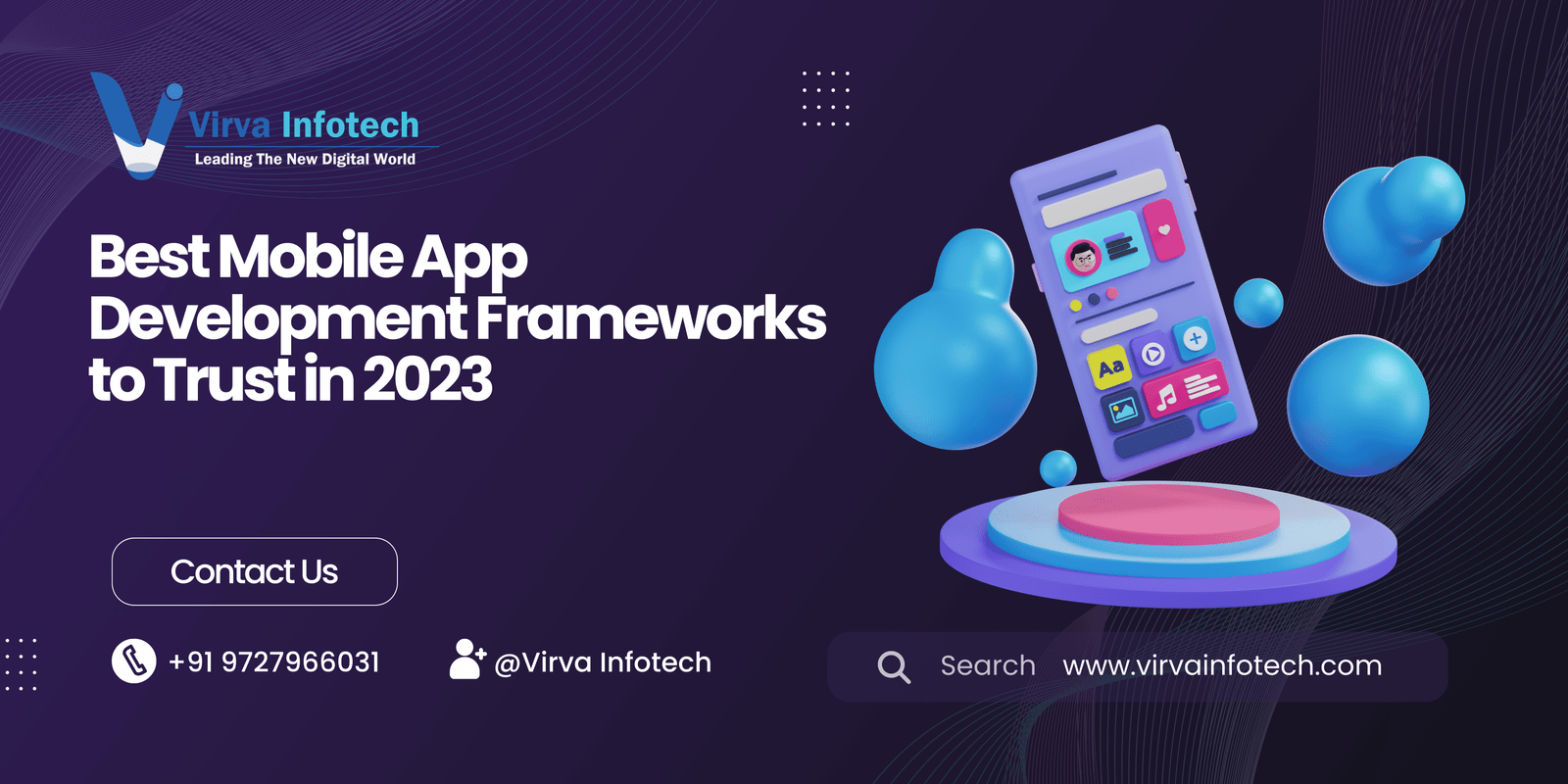Posted At: Oct 12, 2023 - 367 Views

You've likely used countless mobile apps for various purposes, but have you ever wondered about the process of creating these apps and the advantages and disadvantages of different approaches?
Developing a mobile app is more than just writing code; it involves choosing the right mobile app development framework tailored to the app's requirements. These frameworks are essential tools for building mobile apps efficiently, leveraging pre-built code, libraries, and templates to focus on unique features rather than reinventing the wheel for every project.
Let's delve into the most popular mobile app development frameworks to guide you in choosing the right one for your next project while drawing from over 10 years of industry expertise.
Benefits of Mobile App Development
Before we explore the best frameworks, let's highlight the benefits of professional mobile app development:
1. Boosts Customer Engagement: Customized business apps create a direct channel for effective communication between enterprises and customers, enhancing engagement.
2. Improves Efficiency: Tailored business apps increase employee productivity and, consequently, business ROI by performing various functions.
3. Provides More Value to Customers: Integrate customer-loyalty programs within your app to reward users, boosting downloads and retaining customers.
4. Builds Brand Awareness and Recognition: Mobile apps serve as a powerful tool to showcase your brand's values, strengthening your brand identity and customer trust.
5. Boosts Profits: Launching a mobile app alongside a responsive website can increase sales and enhance customer experience, leading to more purchases.
Most Popular Mobile App Development Frameworks
1. React Native: React Native, introduced by Facebook in 2018, is a JavaScript-based app development framework known for its versatility. It allows developers to create apps with a native look and feel for various devices, enabling cross-platform development with a single codebase. Start-ups often favor React Native for its time and cost savings.
2. Flutter: Flutter, an open-source mobile app SDK developed by Google, empowers developers to create visually appealing, native-like applications. It supports various operating systems and devices with a single codebase. Flutter's 2D graphics engine, Skia, ensures a smooth and responsive user interface.
3. Xamarin: Microsoft's Xamarin is an open-source, cross-platform app development framework. It uses languages like .Net and C#, enabling developers to build flexible, high-quality mobile apps. Xamarin excels in building complete ecosystems, including backends, APIs, components, and more.
4. Ionic: Ionic is a free, open-source mobile app framework based on Angular and Apache Cordova. It allows the creation of cross-platform mobile apps for iOS, Windows, and Android. Developers can integrate UI elements, filters, forms, and more to enhance app design.
5. Swiftic: Swiftic focuses on creating seamless iOS apps quickly and easily. With its user-friendly interface, even beginners can develop and publish iOS apps efficiently. Features include premium mobile app templates, push notifications, and loyalty programs.
6. Apache Cordova: Apache Cordova is a popular open-source framework for building mobile apps using web technologies such as CSS, HTML, and JavaScript. It supports multiple platforms and allows access to native device features.
7. Onsen UI: Onsen UI is a robust framework for building complex and feature-rich mobile applications. It works well with HTML, CSS, and JavaScript, supporting various libraries like Angular 2+, React, AngularJS1, and Vue.
8. NativeScript: NativeScript is an open-source framework for building native mobile apps using Vue.js, JavaScript, CSS, Angular, and TypeScript. It provides access to native APIs, ensuring high-performance, native-like applications.
9. jQuery Mobile: jQuery Mobile follows an MVC design pattern to create mobile web applications that resemble native apps. It offers UI widgets for buttons, lists, forms, and more, ensuring a consistent user experience.
10. Corona SDK: Corona SDK is a reliable framework known for developing mobile game apps. It prioritizes speed, simplicity, and flexibility, making it ideal for creating high-quality, fast-performing game apps.
Types of App Development Frameworks
Native App Development Frameworks: Native frameworks are optimized for specific platforms (Swift for iOS, Java for Android). They offer better performance and access to hardware features but can be costly and time-consuming.
Hybrid App Development Frameworks: Hybrid frameworks (Ionic, PhoneGap, React Native) use web technologies for cross-platform development, balancing cost-effectiveness and flexibility. However, they may have limited access to hardware features.
Cross-Platform App Development Frameworks: Cross-platform frameworks (Xamarin, React Native, Flutter) allow code reuse across platforms, offering access to platform-specific features. While cost-effective, they may lack certain functionalities for complex apps.
Selecting the right mobile app development framework depends on your project's goals and requirements. Consider factors like performance, platform-specific features, and development cost when making your choice. If you're uncertain about which framework suits your needs, consult our experienced mobile and web development team at Virva Infotech. Our consultation is free, so reach out today to ensure your project achieves perfection in a competitive market. Your dream app is just a step away!


